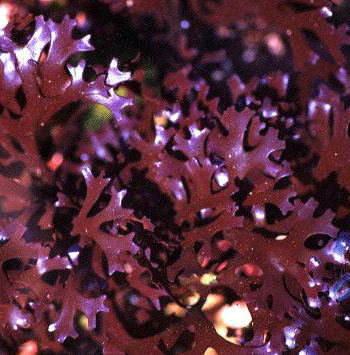Contents:
Common Names | Parts Usually Used | Plant(s) & Culture | Where Found | Medicinal Properties | Biochemical Information
Legends, Myths and Stories | Uses | Formulas or Dosages | Bibliography
Scientific Names

- Chondrus crispus L.
- Gigartinaceae
- Algae family
Common Names
- Carrageen
- Pearl moss
Parts Usually Used
The entire plant
Back to Top
Description of Plant(s) and Culture
Irish moss is a purplish, edible red algae or seaweed. The plant consists of a greenish frond that turns purple when dried.
Back to Top
Where Found
Found on the rocky shores of northern Europe and North America. Grows among submerged rocks off the coast of France and naturally, Ireland.
Back to Top
Medicinal Properties
Demulcent, expectorant, mucilaginous, laxative, emolient, alterative, nutritive tonic
Back to Top
Biochemical Information
Proteins, mucins, amino acids, iodine, bromine, calcium, carrageenan, chlorine, iron, sodium, and manganese salts, phosphorus, potassium, copper, sulphur
Back to Top
Legends, Myths and Stories
Named after Carragheen, Ireland. Irish moss, or carrageen, is a seaweed found in great abundance off the shores of Ireland on the submerged rocks. At low tide it is raked up, washed and dried in the sun, which bleaches it to a tan color. The dried moss has little odor or taste. It forms a stiff mucilage when boiled in water; contains considerable amount of sulphur and small amounts of iodine and minerals. When cooled it becomes a jelly-like substance. Cold water does not dissolve Irish moss, it swells it up. This is why it is used as bulk in the diet for promotion of bowel elimination.
Used in soups, custards, puddings, cold sweets, jelly and wherever thickening is desired. Good for clarifying beer and as a base for skin creams.
Back to Top
Uses
Considered an excellent remedy for tuberculosis and wasting diseases, coughs, bronchitis, and intestinal problems. It makes a nourishing food for those recovering from TB and other illnesses. Medicinally, it is used as a decoction. It is often combined with Iceland moss, comfrey root and honey to form a mucilage for treating the lungs, sore throat and wasting diseases. It is good for dysentery, aids in the formation of bulky stools and corrects diarrhea, and as a digestive aid; has a mild laxative property. Use for thyroid problems (goiter), swollen lymph glands, enlarged prostate glands, convalescence, debility, old age, dry skin, colon disorders, and obesity. Used for hand lotions. Burns are treated with a slave of an extract of Irish moss.
Irish moss contains some crude protein, a scant trace of fat, very little sugar and carbohydrates in indigestible cellulose form; therefore, low calorie recipes prepared with this herb should be of special interest to weight watchers.
Back to Top
Formulas or Dosages
Use dried plant.
Decoction: use 1 tsp. of the plant with 1 cup water. Take 1-2 cups a day.
Or another recipe: boil 1/2 oz. dried moss in 1 1/2 pints of water. Boil down to 1 pint. Add lemon juice for flavor if desired. (More nutritious if boiled in milk) Before boiling in milk or water, allow the moss to soak in cold water for an hour or more to remove saline, then strain off the water.
Back to Top
Bibliography
![]() American Folk Medicine
American Folk Medicine, by Clarence Meyer, Meyerbooks, publisher, PO Box 427, Glenwood, Illinois 60425, 1973
![]() The Herb Book
The Herb Book, by John Lust, Bantam Books, 666 Fifth Avenue, New York, NY. copyright 1974.
![]() The Herbalist Almanac
The Herbalist Almanac, by Clarence Meyer, Meyerbooks, publisher, PO Box 427, Glenwood, Illinois 60425, copyright 1988, fifth printing, 1994
![]() Planetary Herbology
Planetary Herbology, by Michael Tierra, C.A., N.D., O.M.D., Lotus Press, PO Box 325, Twin Lakes. WI 53181., Copyright 1988, published 1992
![]() The Complete Medicinal Herbal
The Complete Medicinal Herbal, by Penelope Ody, Dorling Kindersley, Inc, 232 Madison Avenue, New York, NY 10016, First American Edition, copyright 1993
 Old Ways Rediscovered
Old Ways Rediscovered, by Clarence Meyer, Meyerbooks, publisher, PO Box 427, Glenwood, Illinois 60425, published from 1954, print 1988
![]() The Yoga of Herbs: An Ayurvedic Guide to Herbal Medicine
The Yoga of Herbs: An Ayurvedic Guide to Herbal Medicine, by Dr. David Frawley & Dr. Vasant Lad, Lotus Press, Twin Lakes, Wisconsin, Second edition, 1988.
![]() Prescription for Nutritional Healing, Fifth Edition: A Practical A-to-Z Reference to Drug-Free Remedies Using Vitamins, Minerals, Herbs & Food Supplements
Prescription for Nutritional Healing, Fifth Edition: A Practical A-to-Z Reference to Drug-Free Remedies Using Vitamins, Minerals, Herbs & Food Supplements, by James F. Balch, M.D. and Phyllis A. Balch, C.N.C., Avery Publishing Group, Inc., Garden City Park, NY
![]() Webster’s New World Dictionary
Webster’s New World Dictionary, Third College Edition, Victoria Neufeldt, Editor in Chief, New World Dictionaries: A Division of Simon & Schuster, Inc., 15 Columbus Circle, New York, NY 10023
 The Rodale Herb Book: How to Use, Grow, and Buy Nature’s Miracle Plants (An Organic gardening and farming book)
The Rodale Herb Book: How to Use, Grow, and Buy Nature’s Miracle Plants (An Organic gardening and farming book), edited by William H. Hylton, Rodale Press, Inc. Emmaus, PA, 18049., 1974
